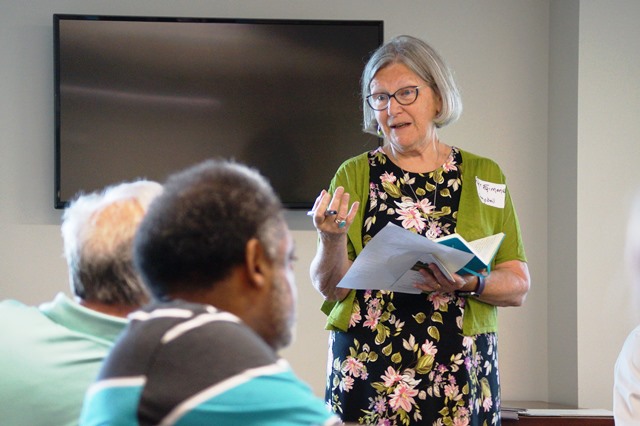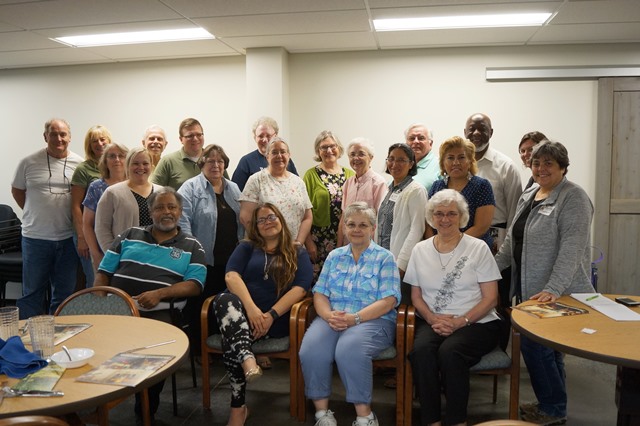Who was there: Row 1: Roy Williams, Veronica Espina, Patricia Kloppenburg, Sister Marcelline Koch; Row 2: Sarah Scheufele, Anne Hilofsky, Sister Sharon Zayac, Sister Simone Campbell, Sister Mila Díaz Solano, Ana Manrique, Sister Rebecca Ann Gemma; Row 3: Leahy Bennet, Teresa Bennet, Dave Steward, John Freml, Sister Elizabeth Wrenn, Jim Dixon, Wesley McNeese, Erica Smith.
Rural Community Roundtable Generates Compassion, Ideas, Understanding
“Explain that to me,” Sister Simone Campbell said. “Why don’t farmers have health insurance?”
Because they are their own bosses, and the cost of private insurance is prohibitive, came the answer.
And that’s why farmers’ wives leave the farm to work.
So who has time, then, to attend PTA meetings, supervise kid’s homework?
This was just one of many exchanges happening at the western edge of Springfield Monday night, where, gathered around tables at Jubilee Farm’s Creative Arts Center, were farmers and educators, medical professionals and social workers, urban community organizers and small-town community builders—and Sister Simone, executive director of Network, a DC-based Catholic social justice advocacy organization that promotes the common good.
By evening’s end, these women and men of diverse ethnic backgrounds and experiences had accomplished something miraculous in our divisive world: recognizing their common connection, understanding the pressures of life in one another’s context, and showing compassion for those whose life and experience they didn’t share.

Trouble in Rural America
This was one of twenty similar meetings planned across the nation by Network. Sister Simone said when she and her colleagues read studies that indicated a smaller income and wealth disparity gap creates a higher quality of life for everyone, they realized they needed to mend that gap. “Then we looked at the maps,” she said. “The common denominator where there was trouble was rural America.”
Sister Simone arrived in Springfield from Clinton, Iowa, where she had similar conversations the day before. She has also spent time in rural communities in Minnesota, Texas, and Mississippi.
Earlier in the day, Sister Simone told Sister Marcelline Koch, OP, the Springfield Dominican promoter of justice, that she and her staff at Network are all “city folk,” with little experience or understanding in the rural community.
“We have to learn something,” she said. “We have to enter into dialogue and understand the reality because we say that we are working for the benefit of the 100%. If we don’t understand the 100% how can we work for it?”
The guests Sister Marcelline convened brought a unique and valued perspective to the table to help Sister Simone and Network learn more deeply the needs of the rural U.S.
Similar Struggles
Roy Williams, a veteran community activist in Springfield and board president of the Faith Coalition for the Common Good, said, at the end of the evening, that he didn’t realize how similar were the struggles in the rural communities around Springfield to those of ours on Springfield’s east side, because there wasn’t much conversation across that boundary. “Our struggles are very similar,” he concluded.
Ana Manrique, a Mexican immigrant, U.S. citizen, and beauty shop owner, expressed something similar. She said that she wants to do anything she can to help Springfield, the community that welcomed her twenty years ago and made her success possible. “If there is something I can do to help the community I want to do it,” she said.
Issues facing rural communities are complex. The dialog helped reveal how systems attuned to profit over people can work in tandem to create challenges people in cities might not expect.
For example, there was an audible gasp in the room when Dave Steward, a retired physician from SIU School of Medicine, said that Sangamon County is number one in the state in clinical care, but ranks 78th out of 102 counties in health outcomes. Digging into that statistic requires understanding issues that include access to care, transportation, health insurance, employment, and racial disparities.
When the conversation turned to the stress on families in rural communities, someone mentioned that while farming spouses used to stay home and support the work on the land, now many must find full time jobs to provide the family with health insurance.
Food deserts were another surprising connection between what is experienced in places like “small city” Springfield, say, and tiny Auburn, or Pawnee. John Freml, a faculty member at Lincolnland and University of Illinois at Springfield, pointed out that the closure of two Shop ‘N Saves in Springfield has left many car-less elderly and low income residents without grocery stores within walking distance. Throughout central Illinois, many of the big box stores displace locally own mom-and-pop businesses with their promise of low prices, then abandon those very communities as the population drops and cuts into their profit margins. It is an open question whether these communities can rebuild.
"Hope around"
As the evening was about to end, Sister Simone asked the group why they like living in their rural communities. In spite of the many challenges acknowledge through the evening, the group remained upbeat.
“There is very specific knowledge in rural communities that’s a treasure,” said Veronica Espina, who is a leader of Springfield’s immigrant rights efforts. “There is something very wise about the knowledge and resiliency and intimacy with the land that we cannot lose.”
Teresa Bennet, whose husband Leahy’s family has farmed the same piece of land in rural Ashland for 153 years, took encouragement from two young couples who’ve just moved to Ashland and are committed to putting down roots in the community and making a difference locally. Her answer to Sister Simone’s question? “There is hope around.”


